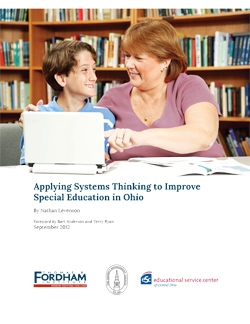“The Writing Revolution” may just be a reading revolution (with thanks to E.D. Hirsch)
Peter MeyerThe "maestro of curricular content" weighs in on the startling success of a writing program
Third-grade reading guarantee: Is money the answer?
Emmy L. PartinThe state board considers $105 million in spending on the third-grade reading guarantee.
Show ponies and workhorses
Aaron ChurchillWhile the education show goes on in Chicago, Ohio's workhorses plow ahead
The Xerox effect
Kathleen Porter-MageeWhy replication in education falls short
Here's one of the great things Portland Public Schools is focusing on instead of the Three R's
Peanut-butter sandwiches, drum circles, and where education took a wrong turn
Is Retaining Students in Early Grades Self-Defeating?
Jeff MurrayThe pros and cons of state policies that require retention of third-grade students
Big Data for Education: Data Mining, Data Analytics, and Web Dashboards
Aaron ChurchillAn IBM-style question to schools: what are you doing to utilize data to improve performance?
The best education for the best is the best education for all
Peter MeyerThe case for a solid liberal arts education beyond high schools
The Xerox effect: Why replication in education falls short
Kathleen Porter-MageeA look at Paul Bambrick-Santoyo's new book, "Leverage Leadership: A Practical Guide to Building Exceptional Schools"
Grit, Luck and Money: Preparing Kids for College and Getting Them Through
Asa SpencerMatriculating is not enough
Applying Systems Thinking to Improve Special Education in Ohio
Nathan LevensonThis paper uses systems thinking to provide common sense ideas for saving money while improving special education services to the more than 275,000 Ohio students with special needs.
Is everything you’ve heard about failing schools wrong?
Kathleen Porter-MageeNo accountability system is perfect, but we can all agree that one that gets it wrong as often as it gets it right is in need of serious reform. But is there any proof that is happening?
The discipline dilemma: Why black kids draw the short straw on suspensions
Peter MeyerRace, school discipline, and curriculum
Common Core opens a second front in the Reading Wars
Kathleen Porter-MageeWelcome to the Battle of Just-Right Texts
The Unintended Consequence of an Algebra-for-All Policy on High-Skill Students: The Effects on Instructional Organization and Students’ Academic Outcomes
John HortonAn empiricist votes “yes” on tracking
Blended learning: innovating the teaching process
Aaron ChurchillAnthony Kim of Education Elements comes to Ohio
Misdirection and self-interest: How Heinemann and Lucy Calkins are rewriting the Common Core
Kathleen Porter-MageeInstead of a helpful resource, their new book simply defends existing--and poorly aligned--curricular material.
Education takes off: Rocketships and high flyers abound
The Education GadflyAggressive marketing campaigns have led to an
Assignment desk: CCSS Math curriculum rankings
Kathleen Porter-MageeThe golden opportunity provided by the “K-8 Publishers Criteria for the Common Core State Standards for Mathematics.”
Twenty-first-century skills, part II: What would Ben Franklin say?
Peter MeyerWho better to speak to contemporary American youth than one of the nation’s most prolific inventors and entrepreneurs?
Will Common Core revive content-driven instruction?
Kathleen Porter-MageeIf it happens, thank E.D. Hirsch
Will Common Core usher in a return to content-driven instruction?
Kathleen Porter-MageeWill the few critical but passing phrases that link the Common Core ELA standards to a content-rich curriculum be enough to drive instructional changes our students so desperately need?
Twenty-first century skills and poverty: Try Thucydides, Socrates, and Kant
Peter MeyerThe power of the humanities
Text Complexity: Raising Rigor in Reading
Kathleen Porter-MageeText complexity is the new black
Does the Common Core overcomplicate text selection?
Kathleen Porter-MageeThe guidance that’s starting to emerge about how teachers can best select “grade-appropriate” texts may actually end up undermining the Common Core’s emphasis on improving the quality and rigor of the texts students are reading.
How top-down policies undermine instruction and feed the testing and accountability backlash
Kathleen Porter-MageeThe autonomy agenda matters
Three persistent myths about science education
Paul GrossGuest blogger Paul Gross addresses the enduring (and false) belief that scientific reasoning is separable from the content of science.
"Just right" books revisited: 3 ways we undermine student learning
Kathleen Porter-MageeIn the end, the “just right” theory of reading instruction is focused on the right goal—having students read independently and with deep understanding. But the way it tries to get there may be exactly what is holding our students back from achieving at the levels they need.

